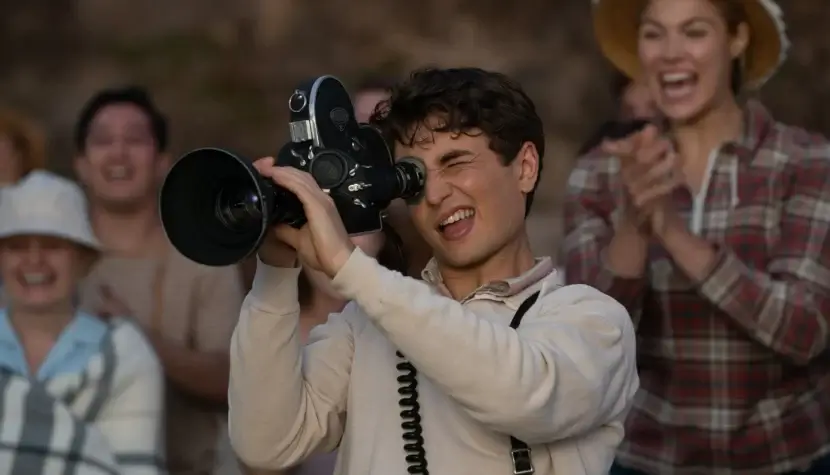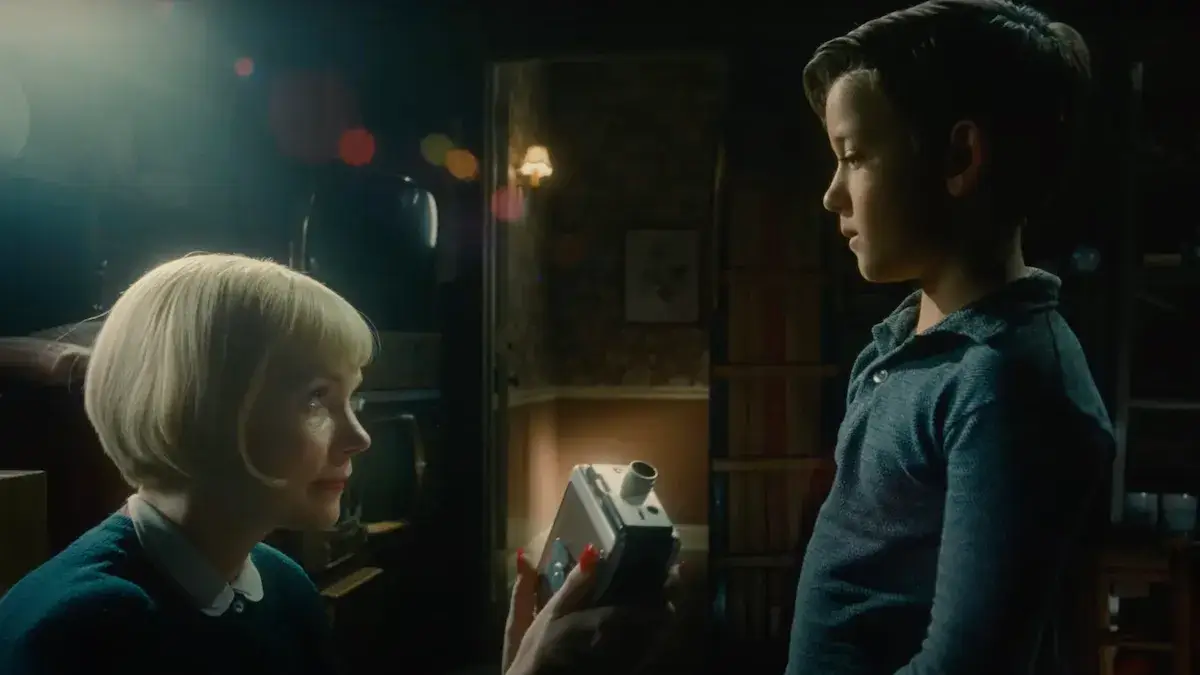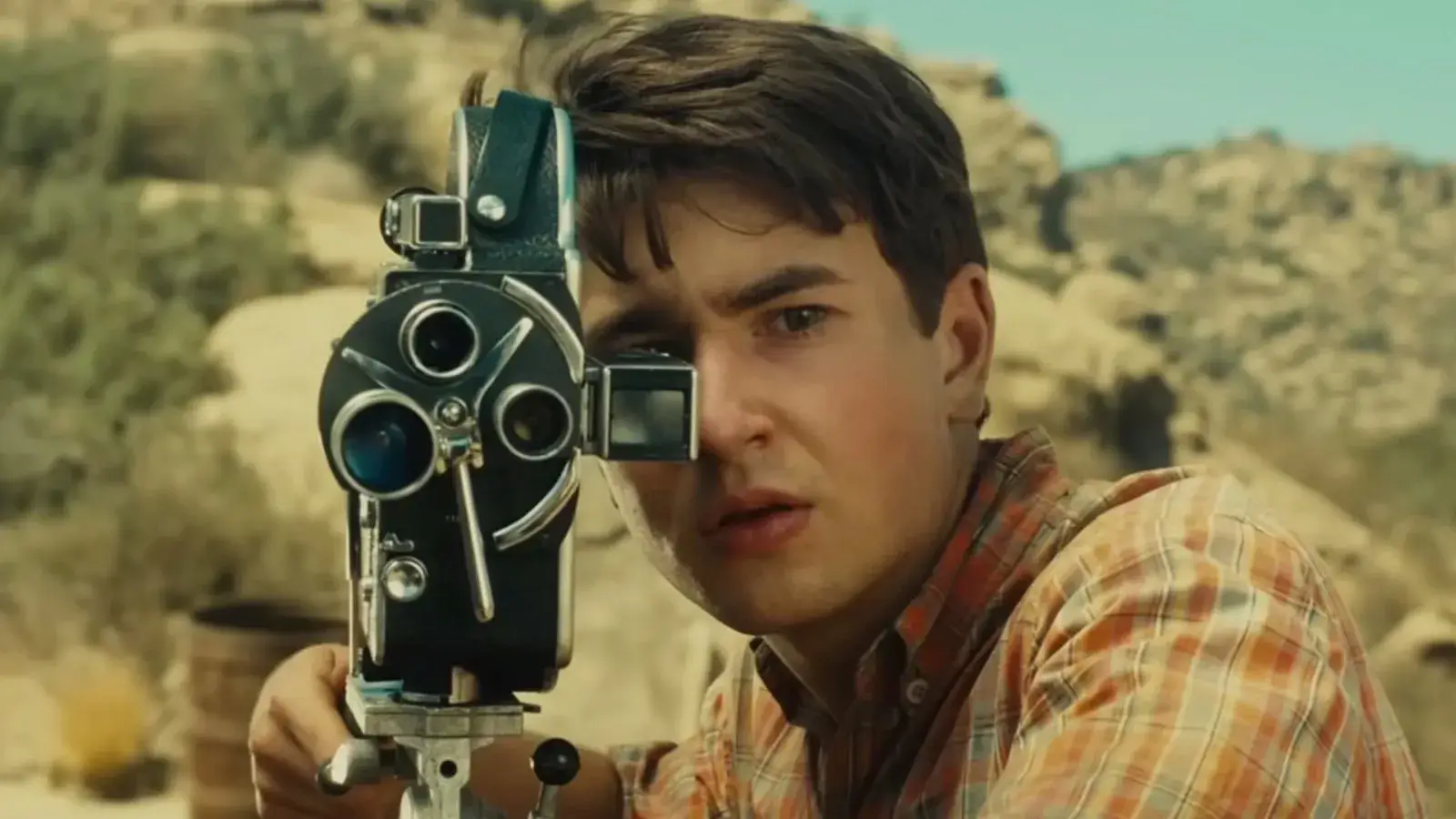THE FABELMANS. Portrait of the artist in his youth

The most personal project in Steven Spielberg’s career begins, of course, on the sidewalk outside the cinema. A few-year-old Sammy is about to watch his first movie on the big screen – Cecil B. DeMille’s The Greatest Show on Earth. He is excited and terrified at the same time. His parents try to calm him down. The father explains that it’s all an illusion: 24 images per second, recorded on tape and then projected onto the screen using light and a projector. The mother is a bit more mysterious, less practical – she assures Sammy, as Konrad Eberhardt once assured Polish readers, that the film is a dream. You should not be afraid of it, but absorb it – with benefit of inventory. The lights go out and the projection begins. Nothing will ever be the same in Sammy Fabelman’s life.
The Fabelmans is primarily a film about cinema, and more precisely about the possibilities of the camera. At first, it becomes a tool that allows little Sammy to recreate his favorite shot from The Greatest Show on Earth. Like any artist, the main character begins by imitating. Over time, the camera turns into an extension of Sam’s hand, who does not part with his favorite device, filming with a handy Bolex, like Jonas Mekas, family’s everyday life. When he accidentally registers the signs of his mother’s affair with his father’s friend, he cannot convey his suspicions verbally – he has to show the film. The medium thus loses the innocence inherent in early, amateur projects with cowboys and soldiers in the lead roles. The protagonist discovers the myth-creating power of cinema while working on the editing of the record from the school Ditch Day. He learns to control the element that film is, to use it for his own purposes. Somewhere between takes, he turns his school nemesis into a demigod – a figure larger than life, devoid of flaws. When the confused boy breaks down in front of the main character, asking why he composed his film in such a way, the answer is ambiguous. Fabelman is not sure if he wanted revenge on his colleague and aroused remorse in him, or if he did it for the sake of the film itself: “to make it better.” In this short, basically allegorical scene, Spielberg stitches up probably the most important, and certainly the most serious truth about the medium he has been using for over 50 years. The truth about its manipulative potential – the scale of its influence and the possibility of shaping people’s fates.

Here Spielberg stops: he leaves Sam right after he gets his first job in the film industry. Like Truffaut in The 400 Blows, Fellini in Amarcord or, to take a more recent example, Sorrentino in Hand of God, and Gray in Armageddon Time, constituting a disguised autobiography, is limited only to the artist’s childhood. A formative process which is followed by everything else. So it doesn’t show us, to the disappointment of some, the work on the fictional counterparts of E.T., Saving Private Ryan or Indiana Jones. The truth is, however, that he does not have to do that – each of these films is encrypted in individual Fabelman episodes. Scraps of the story about the charming alien, openly called by Spielberg his first autobiography, can be found in Sam’s school vicissitudes and bicycle trips with his teenage friends. The landing on the beach in Normandy echoes far in the short war film shot by the hero, and the adventures of the genius archaeologist – in rocky landscapes, traversed by a group of scouts (it’s hard not to think about the first minutes of The Last Crusade at this point). The Fabelmans turns out to be, on one of many levels, a film with a key – one that a large majority of viewers familiar with the works of the most popular American director of all time have.

Spielberg’s film is carried away by self-reflection, it is its most important driving force. More cameras, editing tables, visits to the cinemam amateur short films – all this built the identity of the author of Close Encounters of the Third Kind, so it is not surprising that he builds also his most personal work. The Fabelmans are much worse as a family drama. The casting of Sammy’s parents is unconvincing, and it is an absolutely key issue. Paul Dano is cast bravely, because in spite of the current emploi. After expressive roles in The Batman, Swiss Army Man or There Will Be Blood, the actor came to play the static head of the family – a calm man, emanating kindness and cordiality. Throughout the screening, you wait for his emotional outburst, which ultimately does not happen. It’s a pity – it was in extreme scenes that Dano always found himself best, presenting the full spectrum of his talent. Compared to Michelle Williams, who plays Sam’s mother, he does well anyway. Her character is by far the most complex, and at the same time, the worst acted and written character in the entire film. Her gestures are mannered, her words are tiring, and the whole thing resembles Vivien Leigh’s grotesque performance in A Streetcar Named Desire, except that in Kazan’s movie it was inscribed in the specific, theatrical convention of the work (characteristic of virtually all adaptations of Tennessee Williams’ plays). Spielberg has never been a specialist in in-depth female portraits, and he is well aware of this fact. At some point, it even becomes the subject of a self-deprecating joke: the main character’s sister mockingly asks why there are no female roles in his amateur productions. The boy is eloquently silent, perhaps sensing what the answer should be.
Gabriel LaBelle, on the other hand, plays the main character for most of the film (Sammy is played by Mateo Zoryon Francis-DeFord for the first half an hour). The twenty-year-old actor is a great, undisputed asset of The Fabelmans – his face (deceptively reminiscent of the face of young Spielberg, compare the photos) beats with innocence, and when necessary, it shows stubbornness and passion. Anyway, Spielberg had a good hand with child actors – whatever it sounds like. Henry Thomas and Drew Barrymore in E.T., Joseph Mazzello and Ariana Richards in Jurassic Park, Haley Joel Osment in A.I., Ke Huy Quan in Indiana Jones and the Temple of Doom, Christian Bale in Empire of the Sun. Not all of these child stars made an international career, but each of them shone, if only for a moment, presenting themselves at their best with Spielberg. LaBelle joins this noble group, and time will tell how his adventure with the cinema will go on. The young actor is supported by an excellent second and third plan. The surprisingly good Seth Rogen, playing the “good uncle” on the screen, and thus another version of himself; Judd Hirsch in the role of a relative from abroad, presenting the hero, on his own example, what the artist’s loneliness is all about; and finally David Lynch as John Ford – stealing the show and taking the movie to the next level. It’s worth watching the The Fabelmans if only for the scene with his participation: seasoned with a phenomenal metafilm joke. A few minutes with the author of Twin Peaks is one of the best, and certainly the funniest things Spielberg shot – a wink that turns into a self-referential final touch.
The Fabelmans is an extremely rich work. Treating not only about the love for cinema, the artist’s maturing and the breakup of the family, but also about the specificity of the times, Spielberg’s lost paradise – America of the 1950s and 1960s. Marked by a booming IT industry that shifts Sam’s father from Phoenix to Arizona and from Arizona to California; the fetish of small movie cameras – bought for the last penny of Bolex and Arriflex; finally, the slowly dying golden age of Hollywood, whose tangible symbol is Ford visited by the hero. In the 1970s, Spielberg, Scorsese, De Palma, Lucas and Coppola will take the reins, together with Hopper’s Easy Rider and Penn’s Bonnie and Clyde, laying the foundations for New Hollywood. The Fabelmans is Spielberg’s most lively and energetic film in years.

